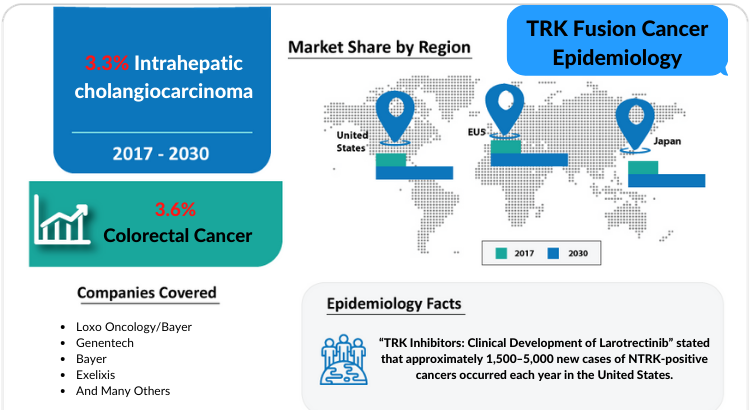“TRK Fusion Cancer Epidemiology” report has been added to DelveInsight
Overview of TRK Fusion Cancer epidemiology, pathophysiology, various diagnostic approaches, and treatment algorithm, including detailed chapters for marketed products and emerging therapies
Download free sample copy here- https://www.delveinsight.com/sample-request/trk-fusion-cancer-epidemiology-forecast
TRK Fusion Cancer Overview
Tropomyosin receptor kinase (TRK) is family of three neurotrophic receptor tyrosine kinase proteins (TRKA, TRKB, and TRKC) encoded by the NTRK1, NTRK2, and NTRK3 genes located on chromosomes 1q23.1, 9q21.33, and 15q25.3, respectively.
TRK Fusion Cancer: Geography Covered
- The United States
- EU5 (Germany, France, Italy, Spain, and the United Kingdom)
- Japan
TRK Fusion Cancer Epidemiology Insights
TRK fusion cancer is a term given to cancers with neurotrophic receptor tyrosine kinase (NTRK) gene fusion. These fusion genes encodes for TRK fusion proteins that activates various signaling pathways which are essential for tumor growth and survival. NTRK gene fusion is identified in around 25 different cancers.
Important facts of TRK Fusion Cancer report
- “TRKing Down an Old Oncogene in a New Era of Targeted Therapy,” the high-throughput next-generation sequencing techniques identified NTRK1, NTRK2, and NTRK3 gene rearrangements encoding novel oncogenic fusions in 19 different tumor types. The frequencies of NTRK1 gene fusion was identified in various cancers as lung adenocarcinoma, 3.3%; intrahepatic cholangiocarcinoma, 3.6%; colorectal cancer, 1.5%; papillary thyroid cancer, 12.3%; spitzoid neoplasms, 16.4%; glioblastoma, 1.1‒2.5%; and sarcoma, 1%.
- NTRK2 gene fusion was identified in astrocytoma, 3.1%; lung adenocarcinoma, 0.2%; head and neck squamous cell carcinoma, 0.2%; and brain lower grade glioma, 0.4%.
- NTRK3 gene fusion was also found in secretory breast carcinoma, 92%; mammary analogue secretory carcinoma, 100%; papillary thyroid cancer, 2.9‒14.5%; congenital mesoblastic nephroma, 83%; congenital fibrosarcoma, 91‒100%; Ph-like acute lymphoblastic leukemia, 0.7%; thyroid carcinoma, 1.5%; cutaneous skin melanoma, 0.3%; head and neck squamous cell carcinoma, 0.2% and in two cases acute myeloid leukemia. Besides, in pediatric gliomas, the frequency of NTRK1/NTRK2/NTRK3 gene fusion was found to be 7.1%.
TRK Fusion Cancer Epidemiology Segmentation
- Incidence of Cancers Involving NTRK Gene Fusions in the 7MM [2017–2030]
- Type-specific incidence of TRK Fusion cancer in the 7MM [2017–2030]
- Incidence of TRK Fusion Cancer in the 7MM [2017–2030]
- Treatable Cases of TRK Fusion Cancer in the 7MM [2017–2030]
TRK Fusion Cancer Epidemiology Report
These receptors are typically expressed in neuronal tissues and have a high affinity for and are activated by neurotrophins. Single-pass transmembrane receptor tyrosine kinases, high-affinity nerve growth factor receptor (TRKA), BDNF/NT-3 growth factor receptor (TRKB), and NT-3 growth factor receptor (TRKC) are essential for the development, maintenance, and function of neural tissues.
TRK Fusion Cancer Diagnosis
The diagnosis of this gene fusion can be identified by various approaches, including fluorescent in situ hybridization, reverse transcription-polymerase chain reaction, immunohistochemistry, next-generation sequencing, and ribonucleic acid-based multiplexed assays.
TRK Fusion Cancer Report Highlights
- 11-Year Forecast of TRK Fusion Cancer epidemiology
- 7MM Coverage
- Total Cases of TRK Fusion Cancer
- Total Cases of TRK Fusion Cancer according to segmentation
- Diagnosed cases of TRK Fusion Cancer
Download free sample copy here- https://www.delveinsight.com/sample-request/trk-fusion-cancer-epidemiology-forecast
Following is the TOC of TRK Fusion Cancer report
1. Key Insights
2. Executive Summary of TRK Fusion Cancer
3. TRK Fusion Cancer: Disease Background and Overview
4. Patient Journey
5. Epidemiology and Patient Population
6. Treatment Algorithm, Current Treatment, and Medical Practices
7. KOL Views
8. Unmet Needs
9. Appendix
10. DelveInsight Capabilities
11. Disclaimer
12. About DelveInsight
Why should you buy this report?
- Develop business strategies by understanding the trends shaping and driving the global TRK Fusion Cancer market
- Quantify patient populations in the global TRK Fusion Cancer market to improve product design, pricing, and launch plans
- Organize sales and marketing efforts by identifying the age groups and sex that present the best opportunities for TRK Fusion Cancer therapeutics in each of the markets covered
- Understand the magnitude of TRK Fusion Cancer population by its epidemiology
- The TRK Fusion Cancer Epidemiology Model developed by DelveInsight is easy to navigate, interactive with dashboards, and epidemiology based with transparent and consistent methodologies. Moreover, the model supports data presented in the report and showcases disease trends over 11-year forecast period using reputable sources
Related Report
TRK Fusion Cancer Market
DelveInsight’s TRK Fusion Cancer – Market Insights, Epidemiology and Market Forecast – 2030 report provides the detailed overview of the disease and in depth understanding of historical and forecasted epidemiology.
TRK Fusion Cancer Pipeline
TRK Fusion Cancer Pipeline Insights, 2021 report by DelveInsight outlays comprehensive insights of present clinical development scenario and growth prospects across the TRK Fusion Cancer market.
Media Contact
Company Name: DelveInsight Business Research LLP
Contact Person: Vinita Rakheja
Email: Send Email
Phone: 9193216187
Address:304 S. Jones Blvd #2432
City: Albany
State: New York
Country: United States
Website: www.delveinsight.com/

